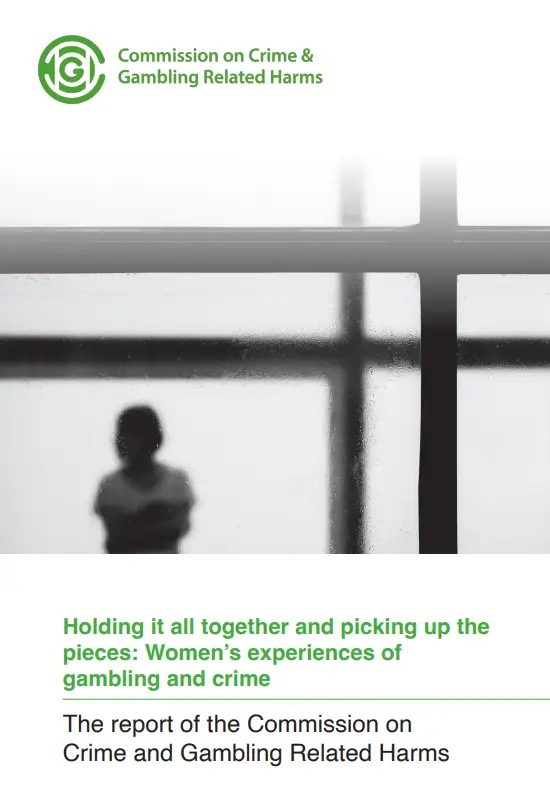We believe in shining a light on stories and research that are too often overlooked. One such piece of work is the powerful study Holding it all together and picking up the pieces: Women’s experiences of gambling and crime, commissioned by the Commission on Crime and Gambling Related Harms.
This pioneering research explores how gambling and crime intersect in the lives of women – whether they gamble themselves or are affected by someone else’s gambling. Uniquely, the study was co-produced with women who have lived through these experiences, offering not only valuable insights but also demonstrating the importance of lived experience in shaping meaningful research.
While gambling is often seen as a male-dominated activity, increasing numbers of women are gambling and facing serious consequences. Yet, most research and services still focus primarily on men. This study addresses that imbalance, investigating how gambling-related harm affects women, especially in relation to crime and the criminal justice system.

The research sought to answer questions such as:
What links exist between gambling and crime for women?
How do women experience and understand their own or others’ gambling?
What support is available, or missing, for those affected?
The study used a peer research model, meaning women with lived experience were trained and supported to help design, conduct, and analyse the research. This approach not only added depth and authenticity but also empowered participants and broke down the traditional researcher-subject divide.
The team carried out 33 interviews and six focus groups with 27 participants, including:
Women who had committed crimes linked to their own gambling
Women who had been harmed by someone else’s gambling
Stakeholders from the criminal justice and support sectors
Almost all participants were women, adding to the study’s deeply gendered focus. The study found:
1. Gambling as a Coping Strategy – With Serious Consequences
Many women began gambling as a way to escape emotional pain, stress, or trauma – such as childhood abuse, financial pressures, bereavement, or relationship breakdowns. Gambling often felt like a “safe space” at first, but over time it led to serious harm.
Some women reported their gambling escalated after early big wins, often encouraged by industry incentives like VIP schemes. When their own funds ran out, several women turned to crime – such as theft or fraud – to sustain their gambling habits.
2. Affected Others: The Hidden Victims
Women who were not gamblers themselves, but were close to someone who was, also suffered deeply. Discovering a partner’s or family member’s gambling problem often came as a devastating shock, with far-reaching emotional, financial, and legal consequences.
These women faced stigma, isolation, and in some cases, were treated as complicit in the crime. Their experiences of trauma were often overlooked by the criminal justice system, leaving them feeling unsupported and misunderstood.
3. The Criminal Justice System: Missed Opportunities
Both gamblers and affected others described a lack of understanding and empathy from police, courts, and probation services. Gambling was rarely identified as a factor in crimes, and support options were often not provided or even known about by professionals.
This gap meant women were punished without addressing the root cause of their behaviour. In some cases, prison environments further normalised gambling and worsened the problem.
4. Services That Don’t Fit
Many women found existing treatment services unwelcoming or unhelpful – especially when these were male-dominated or didn’t account for women’s specific needs. Some spoke of GPs not taking their concerns seriously, or of being uncomfortable in mixed-gender support groups.
On the flip side, women responded positively to peer-led services and spaces where they felt understood and supported by others with similar experiences.
This study paints a stark picture of the systemic gaps and failings when it comes to women, gambling, and crime. But it also offers clear ways forward.
Key recommendations include:
Greater awareness across the criminal justice system of how gambling-related harm affects women
Gender-sensitive treatment options and better support for affected others
Stronger regulation of gambling industry practices, especially VIP schemes
Treating gambling as a public health issue, not just a personal failing
Most importantly, the research underscores the vital role of lived experience in shaping policies and services that truly work. Listening to the voices of women affected by gambling and crime is not just compassionate – it’s essential.
This research is a strong example of how meaningful, inclusive inquiry can help drive positive change. At .. for good, we are proud to spotlight this important work and remain committed to supporting approaches that put people, their stories, and their wellbeing at the centre of change. If you would like to read the full report, you can download it HERE.